|
|
|
Sort Order |
|
|
|
Items / Page
|
|
|
|
|
|
|
| Srl | Item |
| 1 |
ID:
137812
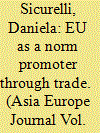

|
|
|
|
|
| Summary/Abstract |
This paper investigates how the external images of the European Union (EU) shape its identity vis-à-vis the USA and focuses on how Vietnamese elites perceive EU-sponsored norms in the context of the ongoing bilateral trade negotiations. The EU emerges as an actor able to export regulatory standards, improve the status of its trade partner within multilateral forums and, at the same time, respect the local ownership of the development process. At the same time, it is criticized for the lack of coherence in its foreign policy, its internal divisions and intrusiveness in Vietnamese domestic politics. Moreover, differences emerge in the way government and non-governmental actors portray the EU, further challenging its univocal representation as a political leader. These perceptions have implications concerning the EU’s ability to export its constitutive principles and values to Vietnam. More broadly, this case study provides insights into the prospects of a future interregional trade agreement with the ASEAN and carries out a critical assessment of the identity and role of the EU as a normative power.
|
|
|
|
|
|
|
|
|
|
|
|
|
|
|
|
| 2 |
ID:
137811
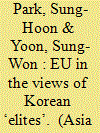

|
|
|
|
|
| Summary/Abstract |
The last two decades have seen most significant developments, which led to incremental upgrading of the Korea-EU bilateral relationship, including the adoption by the European Commission in 1993 of a strategy paper toward Korea, the presidency role played by Korea in the third Asia-Europe Meeting (ASEM) Summit in 2000 and the launch and entering into force of the bilateral free trade agreement (FTA) in 2007 and 2011, respectively, as well as the upgrading of the relationship to a strategic partnership in 2010. The imagery of the EU, however, does not seem to have improved substantially as these series of positive developments in bilateral relationship might suggest, as manifested in a few recent studies conducted on the EU perception in Asia and Korea. As an extension of the two previous interviews of Korean elites carried out in 2006 and 2009, a new round of elite interviews has been conducted to find out how the perception of the EU in the mindset of Korean elites has changed over the past years. The main findings of this paper are as follows. First, among a number of changes found in the comparative analysis of the three interviews, the bilateral FTA that appeared at the top as an immediate image of the EU in the two previous interviews lost its place substantially. Instead, the Eurozone crisis has become one of most influential EU images in the mid of Korean elites. Second, the global actorness of the EU has become substantively weakened in the eyes of the Korean elites over the past few years. As this was most strongly pronounced in the group of media representatives, the authors expect it to have lasting impacts on the images of the EU in the wider Korean public.
|
|
|
|
|
|
|
|
|
|
|
|
|
|
|
|
| 3 |
ID:
137814
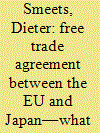

|
|
|
|
|
| Summary/Abstract |
On their summit in May 2011, Japan and the EU decided to negotiate on a Preferential Trade Agreement (PTA). Against this background, the study at hand analyzes PTAs between the EU and third countries by estimating gravity equations on a sector basis consisting of 1-digit SITC groups. On the one hand, it concludes that—except for trade in agricultural goods—PTAs increase bilateral trade above its normal level. On the other hand, that trade between the EU and Japan is undoubtedly too low with regard to distance and size. Therefore, a free trade agreement between the EU and Japan should have a considerable potential to prompt trade-creating effects that increase welfare in both countries. A necessary condition to exploit these gains is, however, not only to abolish tariffs but, more importantly, to reduce nontariff measures to trade.
|
|
|
|
|
|
|
|
|
|
|
|
|
|
|
|
| 4 |
ID:
137813
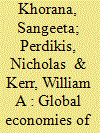

|
|
|
|
|
| Summary/Abstract |
Economies of scale are an alternative source of growth particularly at a time when countries are suffering from global economic malaise. The proposed EU-India free trade agreement holds substantial promise as this will create a combined market of over one and a half billion and generate economies of scale from intra-industry trade, which are likely to be concentrated in manufactured products such as chemicals, machinery and transport equipment. Bold action is needed on the part of politicians in both the EU and India to successfully negotiate the agreement given that this will enable both countries to reap the efficiency gains of global economies of scale, provide a significant competitive advantage over other major economies and deliver the necessary spur to shake both the EU and India out of their current economic stagnation.
|
|
|
|
|
|
|
|
|
|
|
|
|
|
|
|
| 5 |
ID:
137815
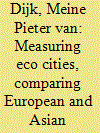

|
|
|
|
|
| Summary/Abstract |
Many cities have taken initiatives to achieve more sustainable development or to become ecological cities. In this paper, ten dimensions are suggested for defining ecological cities and an effort has been made to provide indicators to measure them. Many cities claim to be ecological cities, but there are no non-ambiguous definitions of ecological cities and few efforts have been made to measure to what extent the cities have achieved their goal. This paper considers the efforts of Beijing and Rotterdam to become more eco cities, using these dimensions. What can we learn from these experiences for developing the city of the future? In an illustrative effort to apply the suggested criteria, Rotterdam scored slightly better than Beijing. The latter city is facing more serious environmental problems and is willing to try more innovative solutions, while Rotterdam spends more money on prevention and CO2 reduction.
|
|
|
|
|
|
|
|
|
|
|
|
|
|
|
|
| 6 |
ID:
137816


|
|
|
|
|
| Summary/Abstract |
Increased shale gas and shale oil production in the USA will affect global geopolitics and national security considerations. An influx of Qatari LNG into Europe and Asia, which is diverted from the USA, erodes the tremendous market share held by the Russian gas company Gazprom and significantly reduces its pricing power. The USA did not begin to import the quantities of LNG from countries like Qatar and Trinidad and Tobago. Those quantities have instead been redirected to other markets, including Europe. As part of the impact of the US shale revolution, Russian energy control over Europe will be greatly reduced. Russia’s power over the region will also be reduced. Russia has earned from US$42 billion to US$60 billion per year from selling gas to Europe. Fewer exports and lower prices will cut those revenues. Given the importance of oil and gas companies to Russia’s economics, it is urgent for Moscow to restrict Central Asian production and infrastructure to mainly or even exclusively Russian channels lest Russian oil and gas become less competitive due to its own high cost and wasteful monopolistic structure and dilapidated infrastructure.
|
|
|
|
|
|
|
|
|
|
|
|
|
|
|
|
|
|
|
|
|